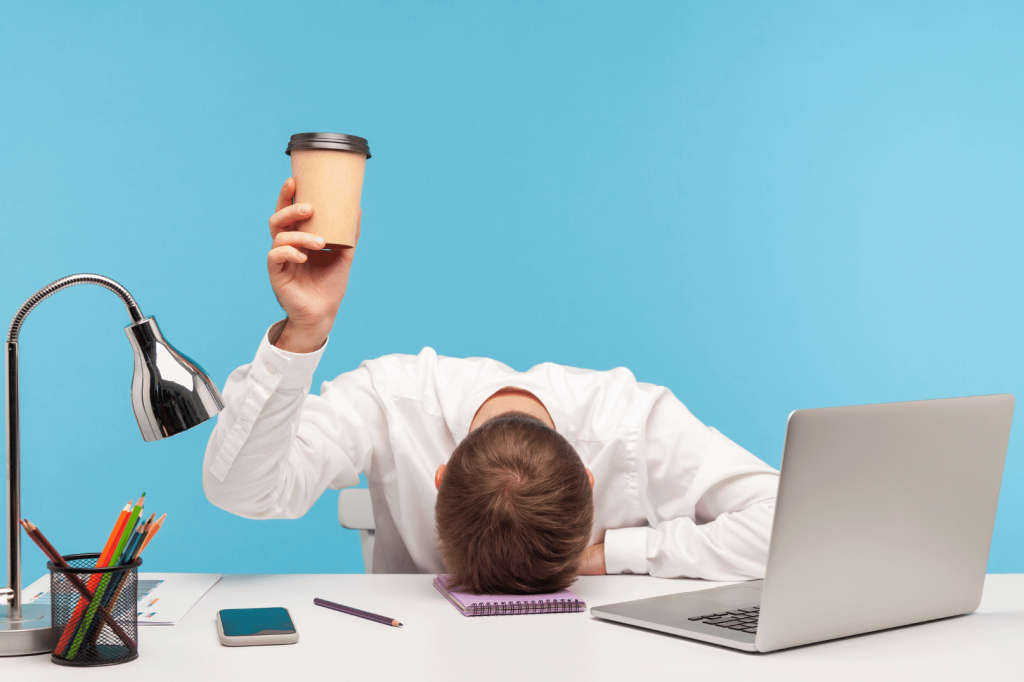
8 Common Mistakes People Make To Cope With And Recover From Sleep Deprivation


8 Common Mistakes People Make To Cope With And Recover From Sleep Deprivation
In the short term, there are reasonable bandaids that can keep you awake and performing after a night of bad sleep, without ruining your overall sleep quality. In the long-term, it’s best to return to healthy sleep habits and circadian rhythm.
To this end, there are right and wrong ways to cope with and recover from sleep deprivation. In this article, we’ll cover everything you need to know for those occasional suboptimal sleep nights.

What Not To Do To Catch Up After Sleep Deprivation
The ultimate goal after sleep deprivation should be to return to your optimal nightly sleep of 7 – 9 hours and minimize the duration that you’ll feel suboptimal from the sleep deprivation. The way most people try to recover from sleep deprivation actually derails their progress. In this section, we’ll cover why.
Note: these recommendations are for those with occasional sleep deprivation, not people who get suboptimal sleep on a regular basis.
1. Sleep In More Than 2 Hours Past Your Normal Sleep Time
If your sleep was suboptimal last night, it might be tempting to hit the snooze button and continue sleeping. But that’s not a good idea.
Your first hour of your sleep is very different from any added hour of sleep past the snooze. Two things govern your sleep: your circadian rhythm and homeostatic sleep drive. Your body clock anchors your sleep with day/night cues, while having been awake for 16 hours makes you sleepy by building up your sleep drive. These two factors mean you’ll get:
- The deepest and most restorative sleep during the first half of your sleep
- More shallow and Rapid Eye Movement (REM) sleep during the latter half of your night
Sleeping in during your usual mornings means you’ll get mostly more shallow and REM sleep because you don’t have the nighttime circadian rhythm and sleep drive to get the deep sleep you need.
During REM sleep, your brain is very active processing memory and learning. While REM sleep is essential, too much REM can make you wake up tired. You may find yourself even more tired and brain fogged after sleeping in, or more tired the more sleep you get.
For the long-term, you want to return to your regular healthy sleep schedule. Sleeping, especially over 2 hours past your normal wake time, can throw off your circadian rhythm and reduce your sleep drive. That means you’ll have a hard time falling asleep at your normal bedtime during subsequent nights. Even if you do, you may get less deep sleep.
Caveat: Epidemiologic studies suggest that among those who cannot get enough sleep during the week, sleeping in on the weekends may mitigate some of the health risks from sleep deprivation. However, it’s not as good as getting enough high-quality sleep every single night. Also, the social jet lag introduced by shifting your sleep schedule can affect your brain function, mood, and even appetite for days
What to do: Wake up within 1 hour of your normal wake time.

2. Take Long Naps, Especially Late In The Day
Your body wants you to sleep, so it might be tempting to take a long nap. Similar to sleeping in, long naps can throw off your circadian rhythm and reduce your sleep drive you’d otherwise have at your bedtime.
What to do: You can still nap but it is best to keep it short and earlier in the day (see next section). Long naps can increase sleep inertia, which basically means you’ll feel more tired and groggy after waking up.
3. Consuming Large Meals Too Close To Bedtime
Consuming large meals before bedtime forces the body to use energy for digestion. Digestion is an active process where enzymes are secreted, intestinal muscles contract, and the body uses energy to break down food. During sleep, your body is already trying to use energy to balance:
- Hormones
- The immune system
- Brain function
- Repair damaged tissues
- And more
Laying down after a large meal can also cause heartburn.
If you eat too close to bedtime, you’ll likely wake up more frequently throughout the night. This eating habit makes sleep less efficient, and more awakenings means you’ll need more time in bed to feel rested.
What to do: Aim for the last meal to be 2, ideally 3, hours before laying down for bed.
4. Relying On Caffeine To Function All Day
Caffeine works by blocking your sleep drive molecule called adenosine and increasing wakefulness neurotransmitters. It doesn’t replace sleep, but instead blocks you from feeling tired. In the process, it can also keep you awake or prevent restorative sleep. Worse yet, it can take your liver 5 – 6 hours to remove half the caffeine from your body.
The less caffeine you have in your body at bedtime, the less likely it is to keep you awake or interfere with your sleep quality.
What to do: Avoid relying on caffeine to stay awake, especially past noon.
5. Using Alcohol To Fall Asleep
Alcohol is very bad for sleep quality. You might find it sedating at first, but this effect disappears after a few hours. If you drink yourself to sleep, you’ll have severely disrupted sleep during the second half of the night.
Alcohol can also change sleep architecture by suppressing deep and rapid eye movement (REM) sleep Since alcohol can change how the body sleeps, it can cause disrupted, poor quality sleep later in the night.
What to do: Avoid alcohol
6. Exercise Within 3 Hours Of Bedtime
Regular exercise can improve sleep, but it can keep you up if you do intense exercise too close to bedtime.
Exercise can release stimulating neurochemicals, so it helps wake you up or helps you stay awake within a few hours of the session. These are great signals for starting or continuing the day, not so much for preparing the body to fall asleep.
Exercise can increase body temperature for an hour or two after physical exertion. It can be difficult to drop the core temperature of the body in the evening so that the brain can effectively initiate sleep.
What to do: Exercise, but at least 4 hours away from your bedtime.
7. Looking At Screens Right Up Until Bedtime
The light from electronic devices, especially blue light from screens, can suppress the natural release of melatonin from your brain. Melatonin is a hormone crucial for initiating sleep. The content from TV or social media can be overstimulating or stressful and activate the sympathetic nervous system.
What to do: For optimal sleep, it’s best to lay off the screens and read a relaxing book for at least 1 – 2 hours leading up to bed time.

8. Lay In Bed Awake When You Can’t Fall Asleep
If you can’t fall asleep for more than 20 minutes, then it is best to get up, go to another room, and do a relaxing activity until you feel sleepy. Not being able to sleep can make you wound up, which can then make it more difficult to fall asleep and send you on a downward spiral. The bedroom is a place that we want the body to remember as a pleasant place to be.
What to do: Get up and do a relaxing activity until you’re sleepy. Also, try Sleep Breakthrough and Dream Optimizer 30 minutes before bedtime to ease into sleep.
Now that you’ve learned about the most common mistakes to recover from sleep deprivation, in the next article, Part 2, we’ll cover tips to help you maintain your best self and recover fast from sleep deprivation.
References
- Åkerstedt T, Ghilotti F, Grotta A, et al. Sleep duration and mortality – Does weekend sleep matter? J Sleep Res. 2019;28(1):e12712. doi:10.1111/jsr.12712
- Wittmann M, Dinich J, Merrow M, Roenneberg T. Social jetlag: misalignment of biological and social time. Chronobiol Int. 2006;23(1-2):497-509. doi:10.1080/07420520500545979
- Trotti LM. Waking up is the hardest thing I do all day: Sleep inertia and sleep drunkenness. Sleep Med Rev. 2017;35:76-84. doi:10.1016/j.smrv.2016.08.005
- Eastman SR. Getting a good night’s sleep. Provider. 1995;21(1):74, 77. Accessed May 6, 2023. https://www.nia.nih.gov/health/infographics/getting-good-nights-sleep
- Caffeine & long work hours. Cdc.gov. Published April 26, 2022. Accessed May 6, 2023. https://www.cdc.gov/niosh/emres/longhourstraining/caffeine.html
- Thakkar MM, Sharma R, Sahota P. Alcohol disrupts sleep homeostasis. Alcohol. 2015;49(4):299-310. doi:10.1016/j.alcohol.2014.07.019
- Colrain IM, Nicholas CL, Baker FC. Alcohol and the sleeping brain. Handb Clin Neurol. 2014;125:415-431. doi:10.1016/B978-0-444-62619-6.00024-0
- Li W, Ma L, Yang G, Gan WB. REM sleep selectively prunes and maintains new synapses in development and learning. Nat Neurosci. 2017;20(3):427-437. doi:10.1038/nn.4479
- Stutz J, Eiholzer R, Spengler CM. Effects of evening exercise on sleep in healthy participants: A systematic review and meta-analysis. Sports Med. 2019;49(2):269-287. doi:10.1007/s40279-018-1015-0
- Exercising for better sleep. Hopkinsmedicine.org. Published August 8, 2021. Accessed May 6, 2023. https://www.hopkinsmedicine.org/health/wellness-and-prevention/exercising-for-better-sleep
